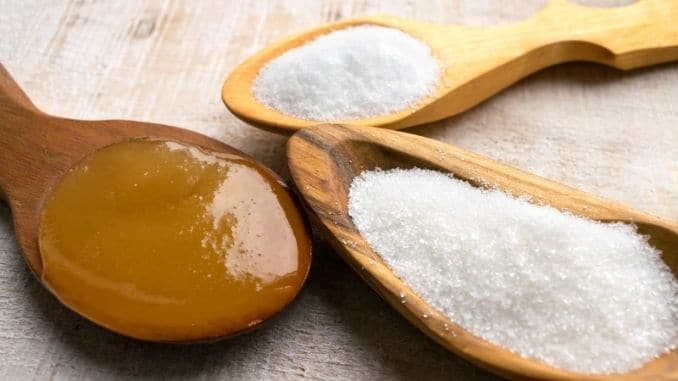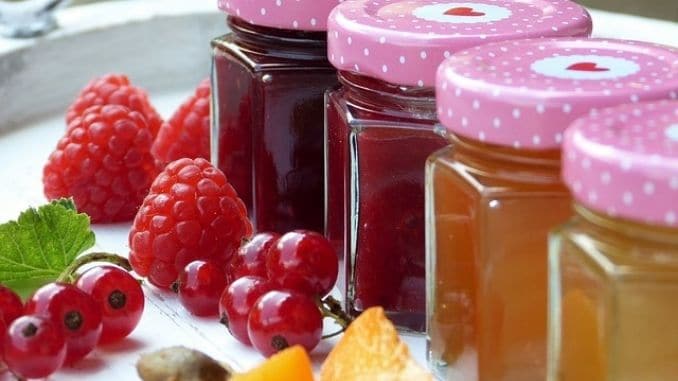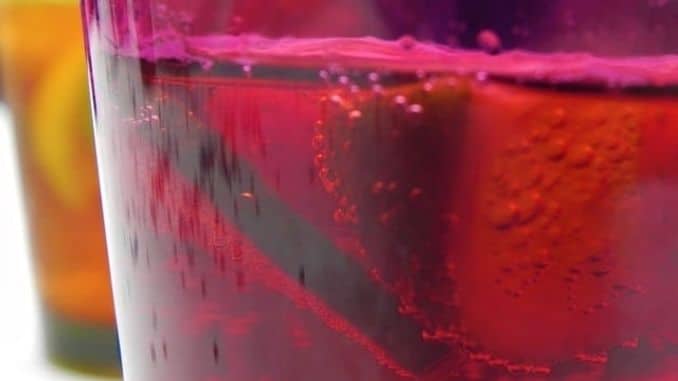
Maintaining a healthy weight continues to be a difficult challenge for over a third of adults. The Centers for Disease Control and Prevention (CDC) states that in 2015 to 2016, the prevalence of obesity ― defined as having a body mass index of 30 or higher ― was 39.8 percent, affecting about 93.3 million people.
Nationwide, roughly two out of three United States adults are overweight or obese (69 percent). The epidemic is hitting children and teens as well with youth becoming overweight and obese at earlier ages. It’s a dangerous trend since being overweight and obese is linked with an increased risk of type 2 diabetes, cardiovascular disease and some forms of cancer.
To lose weight, many have turned to sugar-free options when choosing beverages and treats, but recent studies have suggested that some of these no-calorie sweeteners may be doing more harm than good.
Recently, more “natural” sugar-free sweeteners like stevia have become available on the market. Are these sugar alternatives really better for us than the ones that came before?
The Problem With Artificial Zero-calorie Sweeteners
The search for the perfect low-calorie sweetener has been ongoing for more than 100 years. Back in 1879, researchers were working on developing a drug when they discovered saccharin, a coal-tar derivative 300 times sweeter than sugar. A couple of decades later, saccharin was found in a variety of canned foods. It was banned but approved again during World War I when the supply of real sugar was limited.
FDA
Other zero-calorie sweeteners would follow. In the 1950s, the U.S Food and Drug Administration (FDA) approved cyclamate (originally in Sweet ’n Low), which was about 30 to 50 times as sweet as sugar and the diet soda industry was born. Aspartame was discovered in the 1960s, but there were problems taking it to market.
The FDA banned cyclamate after finding that large doses caused bladder tumors in animal studies. At that point, Sweet ’n Low became mostly saccharin-based but, in the 1970s, the FDA attempted to ban saccharin from its safe list as well. They were unsuccessful due to public opposition, so they settled for requiring a serious health warning on the product label. They also refused approval for aspartame at that time because of potential links to brain tumors.
In the 1980s, the FDA changed their minds and approved the use of aspartame as a food additive. The sweetener was branded and sold as “NutraSweet,” and soared in popularity quickly, but reports of problems continued.
Meanwhile, sucralose — marketed as Splenda — was created in 1976 when scientists figured out how to bond sucrose molecules with chlorine. Splenda was approved in 1998 in the U.S. and became the most popular artificial sweetener on the market.
In 2000, based on new research establishing safety, the FDA agreed that the health warning on saccharin products could be dropped from the labels.
Today, the most popular artificial sweeteners are saccharin (Sweet ’n Low), acesulfame potassium (Sunett), aspartame (Nutrasweet and Equal), neotame (Newtame), and sucralose (Splenda). These are all FDA-approved for use in foods and beverages, but there remains concern about how safe they really are.
Health Concerns With Artificial Sweeteners
Newer research has shown that some earlier concerns about the health risks of sugar substitutes — particularly that they may cause cancer — may have been overblown. It’s also brought up other concerns, however, about how these ingredients might affect our health.
Perhaps one of the most surprising findings has been that these low-calorie sweeteners may contribute to weight gain rather than weight loss. In one review of 37 studies involving more than 400,000 people, for instance, researchers found that those who regularly drank one or more diet colas a day had a higher risk for weight gain, obesity, diabetes, and heart disease.
Why would this be? We don’t know for sure yet, but there is some evidence that these sweeteners interfere with the natural gut microbiome — that balance of good and bad bacteria in the stomach and intestines — which could affect weight gain. They’re also several times sweeter than sugar, which appears to stimulate increased sugar cravings, potentially creating a sugar dependence.
What about the potential links to cancer? Although some early animal studies showed a link, the National Cancer Institute and other health agencies report that there is currently no sound evidence that any of the artificial sweeteners on the market today cause cancer or other serious health problems and that, in general, they are safe in limited quantities.
That’s not a ringing endorsement, however, so that when more natural low-calorie sweeteners came on the market, they were a welcome alternative.
4 Natural Low-calorie Sweeteners
With the evidence we have so far, the following natural sweeteners appear to be safe to use. It is important to note that, however, they originally came from natural sources like fruits, manufacturers often use extensive modern-day processing methods to produce them in high quantities for the market.
1. Stevia
Stevia is extracted from the leaves of the Stevia rebaudiana plant, which is related to the sunflower and has grown for centuries in South America.
The main compound in the extract, stevioside, is 200 times as sweet as sugar and has zero calories. It’s stable even when heated, and thus can be used not only in sodas and other beverages but in cooking recipes as well. Because it’s much sweeter than sugar, you don’t use as much, making up the bulk with substitutes like egg whites, yogurt, coconut flour or fresh fruit puree.
The American Diabetes Association includes stevia on its list of recommended sugar substitutes as some studies have found that it helps lower blood sugar levels in people with diabetes. Other studies have also shown that it may lower blood pressure in those with high blood pressure and can lower blood sugar levels in people with diabetes.
There are differences in how stevia is processed, however, so you may want to look for organic types. Conventional brands may be heavily processed and bleached. If you see “green stevia leaf” on the label, that signifies the least-processed type. If you’re purchasing the powdered form, look for green or brown powders — clear versions are highly refined.
2. Erythritol
Certain fruits naturally contain erythritol, which is a sugar alcohol. Other similar sugar alcohols include xylitol, sorbitol, and mannitol. Most of that which is available on the market, however, is synthetically made ― often from cornstarch. It’s not calorie-free, but nearly so, and has been shown in studies to be safe. However, you may experience digestive issues when consuming it.
In a 2006 study, for example, researchers had healthy adult volunteers consume a variety of sweetened beverages, some of which contained varying amounts of erythritol or xylitol. They found the following results, compared with consuming regular sugar:
- Consumption of xylitol significantly increased the number of subjects experiencing nausea, bloating, colic, watery feces and bowel movement frequency.
- Consumption of erythritol significantly increased the number of subjects reporting nausea and gas.
Other studies have confirmed that the ingredient causes digestive issues, including diarrhea, and that symptoms can worsen the more you consume it.
Scientists know that, in general, sugar alcohols can cause digestive issues as when they reach the colon, they ferment and cause gas. Indeed, if you are sensitive to FODMAPs (“fermentable oligo-, di-, mono-saccharides and polyols”), a certain category of carbohydrates that can cause digestive issues, you likely won’t get along well with erythritol, either.
Watch ingredient labels as erythritol is often combined with other artificial sweeteners like stevia.
3. Monk Fruit
This sweetener comes from a small fruit native to Asia that has long been used as a natural sweetener. It looks like a gourd and grows on a vine. It is also called luo han guo or swingle, and monks were the first to cultivate it in the 13th century, which is where the fruit’s name came from. It’s fairly new on the U.S. market, having been approved by the FDA in 2010.
Monk fruit products are made by juicing the fruit and then processing the juice into crystal form. Compounds called mogrosides are separated from the other regular sugars in the juice as they are not absorbed in the upper gastrointestinal tract and don’t contribute any calories.
Depending on the level of mogrosides in the monk fruit product, it’s about 150 to 200 times sweeter than sugar and found in brands like Nectresse, PureLo, Purefruit, Fruit-Sweetness and Monk Fruit in the Raw. Like stevia, monk fruit is stable at high temperatures, so it can be used in cooking.
Because this product is relatively new on the market, we don’t have many studies on it yet. At present, it tends to cost more than other natural sugar substitutes as it’s costly to grow, import and export. The taste is also a bit different too. Some find it unpleasant, which is why it’s often combined with other sweetening ingredients.
4. Xylitol
Xylitol is another sugar alcohol, usually extracted from birch wood or corn. It has a similar sweetness to sugar but about 40 percent fewer calories so, while it’s not calorie-free, it does provide a low-calorie sweetening option.
Xylitol is often found in chewing gum, mints and other dental products as it can increase saliva production and freshen breath. Some studies have even found xylitol, with regular use, may help prevent cavities. It has a low glycemic index and will not spike sugar or insulin, so it’s safe for those with diabetes and prediabetes.
Like erythritol, however, xylitol can cause digestive distress, including gas, bloating and diarrhea, depending on how much you eat or drink.
Best Option for Health May Be to Limit Sweet Tastes Overall
It appears clear that small amounts of these natural sweeteners can be helpful to people who are trying to lose weight or who want to enjoy a sweet treat without the sugar. They may be particularly helpful for those with diabetes and related health issues.
The best long-term solution for optimal health is to wean ourselves off our need for highly sweet foods. Eating sweets seems to compel us to want to eat more, and artificial sweeteners, even if they are from natural sources, may create even stronger sugar cravings over time.
For the best foods to heal and slim your body, check out The Best Foods that Rapidly Slim & Heal in 7 Days, here!





